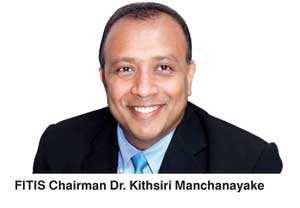Tuesday Feb 17, 2026
Tuesday Feb 17, 2026
Thursday, 3 May 2018 00:00 - - {{hitsCtrl.values.hits}}
Ambitious plans are now on the cards to develop the Information Communication Technology (ICT) industry through the Federation of Information Technology Industry Sri Lanka (FITIS), the apex ICT industry association in Sri Lanka. 
FITIS represents the all ICT industry segments including hardware, software, education and training, communication and professional. It will drive the ICT industry to its full potential to achieve national objectives, said Dr. Kithsiri Manchanayake at his re-election as FITIS Chairman at the Annual General Meeting held recently at Hilton Colombo Residences.
“I am honoured to have been given the opportunity to lead FITIS for another year,” said Dr. Manchanayake. “In order to achieve the new, enhanced targets, we have to make a series of significant changes for the forward-march and overall progress of Sri Lanka’s ICT industry. We have worked out a comprehensive plan of action to make this initiative a reality.”
He promised to continue building on the good work achieved thus far. “Certainly, we will continue playing an active role as the voice of the ICT industry. Given the dynamic and rapidly-evolving technological environment permeating all sectors, including where the battle against poverty is waged, there is plenty to cover and FITIS will hit the ground running,” said Dr. Manchanayake.
Key to its efforts would be continued dialogue and partnership with key stakeholders that include the government, industry, and users, with a view to harnessing the potential of ICT for promoting and supporting inclusive growth.
ICTs are considered the conveyor belt of globalisation and have tremendous influence on the functioning of global and national economies.
“The role that ICT plays is for the benefit and betterment of our citizens. They help find innovative solutions to address the daily challenges we face; poverty, unemployment, lack of access to quality education and health care, and climate change, to name but a few. We look to bring new ideas to the table in this regard and also continue to push the Federation’s existing causes. We are conscious that unless Sri Lanka comes to grips with the challenges of ICTs, we may be left behind in the ICT revolution,” said Dr. Manchanayake.
FITIS recognises that although the ICT revolution is well underway in some parts of the country, many of those who stand to gain from it are not yet connected. While certain segments of the population are benefitting from ICTs, many are left behind because of their age, limited digital literacy, lack of access, or remoteness.
Dr. Manchanayake emphasises that in order to better leverage ICTs for development, a higher level of preparedness and better infrastructure accesses are needed.
“In this context, Government leadership and vision are critical. ICTs have the potential of opening up new digital divides. In the absence of corrective mechanisms, ICTs could indeed contribute to a non-inclusive type of growth, thus exacerbating the problem rather than mitigating it,” he stressed.
However, if harnessed properly, ICTs can create economic opportunities and foster social and political inclusion, ultimately contributing to shared prosperity.
FITIS represents Sri Lanka at two main regional ICT alliances such as ASOCIO (Asian Oceanian Computing Industry Organisation) and APICTA (Asia Pacific ICT Alliance) and FITIS plans to carry out some business matchmaking events between local companies and counterparts in other countries to promote local software internationally by using this opportunity.